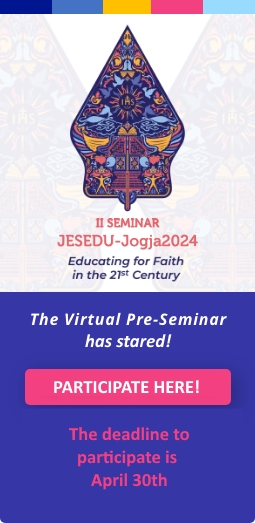The SIPEI vision statement defines the committed person as, “A person of commitment is one of courageous action. Through our openness to the guidance of the Spirit and companionship with Jesus, he or she will be able to discern the urgent needs of our time, so that our ways of serving will be as rich and deep as our ways of loving. We realize that an Ecological commitment to the reconciliation and healing of the earth, hand in hand with the commitment for social justice, are urgent needs as they affect all persons everywhere on the earth.”
In this article, we would like to highlight resources that can help us go deeper into the path of transformation to commitment and provide practical resources for teachers in our global community to use or adapt to their context in the classroom.
“The education of the committed person according to the Ignatian perspective will require our schools to provide students with transformative experiences to help them form expansive hearts and minds, real persons of solidarity with all those in suffering, disadvantage or oppression.” Human Excellence: CCCC. p.9. Jesuit Education: The Committed Person.
In order to help or guide students into the path of transformation to being committed persons we would like to propose going back to reading and reflecting on Father Joseph Carver’s presentation shared at SIPEI in 2014 on what it means to be a Committed Person. For this, we propose watching or reading his excellent lecture. “My assertion is that Christians, particularly committed Christians, have a particular role in the environmental movement because of our understanding of both the incarnation and communion.” Committed Person. Joseph Carver SJ.

After reflecting on this lecture we propose including in your classroom the following lesson plans:
- “History Lesson – Caring for the Environment“, this lesson leverages a historical context to inspire students to create their own propaganda for the 21st century’s great challenge: climate change.
- “English Lesson – Caring for the Environment“, this lesson brings together a contemporary issue of environmental justice and the power of writing to make something invisible, visible. In a couple of class periods, this lesson ties together three of the four Universal Apostolic Preferences: #2 Walking with the Excluded, #3 Journeying with Youth, and #4 Caring for our Common Home.
- “Ignatian Spirituality and Ecology: entering into conversation“, this lesson provides guidelines to practice an Ecological Examen by doing the five moments of the traditional examen.

We encourage you to reflect on and implement these great resources, and also to share in this context, what has your educational apostolate done? What should your educational apostolate be doing?
You can find more classroom resources like this in the Classroom Materials section of Educate Magis.
If you have useful resources on the Committed Person to help deepen our knowledge on this dimension of the 4C’s, please email them at info@educatemagis.org. Thank you!
